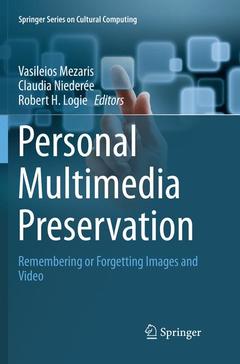Description
Personal Multimedia Preservation, 1st ed. 2018
Remembering or Forgetting Images and Video
Springer Series on Cultural Computing Series
Coordinators: Mezaris Vasileios, Niederée Claudia, Logie Robert H.
Language: English
Subjects for Personal Multimedia Preservation:
Publication date: 01-2019
Support: Print on demand
Publication date: 03-2018
Support: Print on demand
Description
/li>Contents
/li>Biography
/li>Comment
/li>
This unique text/reference advocates a novel forgetful approach to dealing with personal multimedia content in the long run, which is inspired by the effectiveness of human forgetting as a mechanism for helping us to stay focused on important things. The text presents theoretical foundations, technologies, applications, and case study results that help the reader to understand the problems and challenges associated with personal digital preservation, and the solutions that can be developed in response to these challenges.
Topics and features: Highlights the value of an intelligent and selective approach to personal multimedia preservation, involving managed forgetting and contextualized remembering; considers how a conceptual understanding of human memory function can be used to inspire the design of digital managed preservation and forgetting; discusses methods that endow computers with capabilities to understand digital content, in order to support intelligent preservation decisions; examines the assessment of the importance of information items, introducing the concepts of memory buoyancy and preservation value; reviews methods for preserving the context associated with a digital item, and for assessing how this context evolves over time; proposes a reference model for the Preserve-or-Forget (PoF) approach which is integrative, value-driven, brain-inspired, forgetful, and evolution-aware; describes the integration of preservation functionalities in a Personal Information Management (PIM) application; presents a user study on a photo selection task, using the results to design methods for automatically selecting important photos from personal collections.This interdisciplinary volume provides significant insights from computer science, engineering and psychology that will be of great interest to researchers involved in multimedia and software engineering, multimedia preservation, cultural informatics, digital heritage, and the digital humanities.Part I: Interdisciplinary Foundations
Multimedia Preservation: Why Bother?
Claudia Niederée, Vasileios Mezaris, Heiko Maus, and Robert H. Logie
Preserving and Forgetting in the Human Brain
Robert H. Logie, Maria Wolters, and Elaine Niven
Multimedia Processing Essentials
Konstantinos Apostolidis, Foteini Markatopoulou, Christos Tzelepis, Vasileios Mezaris, and Ioannis Patras
Part II: Multimedia Preservation Theory
Preservation Value and Managed Forgetting
Claudia Niederée, Nattiya Kanhabua, Tuan Tran, and Kaweh Djafari Naini
Keeping Information in Context
Mark A. Greenwood, Nam Khanh Tran, Konstantinos Apostolidis, and Vasileios Mezaris
Bridging Information Management and Preservation: a Reference Model
Francesco Gallo, Claudia Niederée, and Walter Allasia
Part III: Multimedia Preservation in Practice
Remembering and Forgetting for Personal Preservation
Heiko Maus, Christian Jilek, and Sven Schwarz
Personal Photo Management and Preservation
Andrea Ceroni
Dr. Vasileios Mezaris is a Senior Researcher at the Information Technologies Institute (ITI) of the Centre for Research of Technology Hellas (CERTH), Greece.
Dr. Claudia Niederée is affiliated with the L3S Research Center in Hannover, Germany, where she works as a research group leader. She was coordinator of the ForgetIT EU project (2013-2016), which looked into digital forgetting processes in the context of preservation.
Prof. Robert H. Logie is affiliated with the University of Edinburgh, UK, where he is currently Professor of Human Cognitive Neuroscience within the Department of Psychology and the Centre for Cognitive Ageing and Cognitive Epidemiology.
Highlights how to leverage the power of human forgetting and remembering in the digital world
Illuminates new perspectives on how to deal with personal content in the future
Provides concrete applications showing how to implement a forgetful approach
These books may interest you

Forgetting 64.97 €



